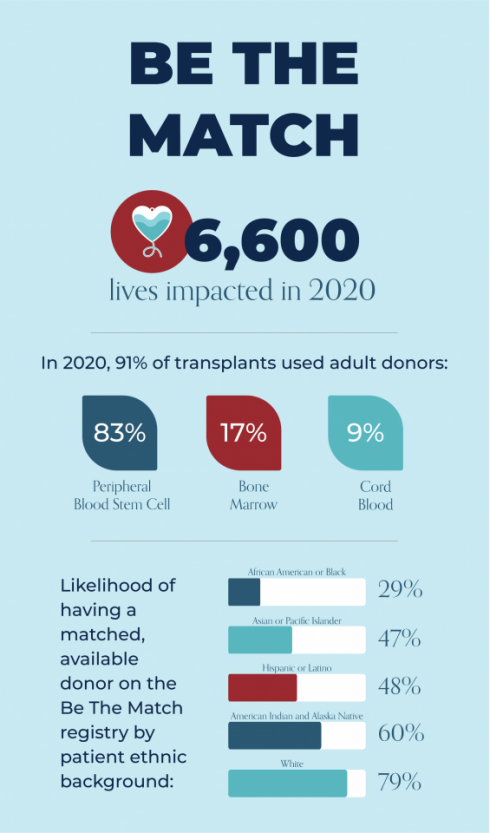How to Save a Life
 During a meeting of the U-M Student Nurses Association her first semester on campus, Zick joined the bone marrow donor registry through Be The Match, the National Marrow Donor Program. “It can't hurt to sign up,” Zick thought. “They sent a cheek swab to my dorm, I sent it back and then didn’t think much about it.”
During a meeting of the U-M Student Nurses Association her first semester on campus, Zick joined the bone marrow donor registry through Be The Match, the National Marrow Donor Program. “It can't hurt to sign up,” Zick thought. “They sent a cheek swab to my dorm, I sent it back and then didn’t think much about it.”
Finding a match is essential for thousands of blood cancer patients, but in many cases it’s unlikely. Only one in every 430 prospective donors on the registry has a chance of matching with someone in need. “Every three minutes, someone is diagnosed with a blood cancer in the United States and told they need of a transplant as a part of their cure,” said Nichole Badura, a stem cell recruitment specialist for Versiti, a Be The Match network partner. “Only 20% of these patients will have a match in their family, so the rest of them defer to our registry. But there are not enough donors for every patient in need.”
Answering the call
Zick doesn’t usually answer phone calls from unknown numbers, but in December 2020, she picked up and learned she might be able to save someone’s life. “That initial cheek swab gives us some information about whether you match, but further bloodwork is needed to tell us just how well you match for a patient,” Badura explained. Additional tests confirmed that Zick was an ideal candidate.
“They said I was a near perfect match,” she recalled. “It usually takes up to six months from that first phone call to the actual donation, but my recipient wasn't doing well, so things moved quickly.”
Extra practice
 Leading up to her donation, Zick had to inject herself with Neupogen, a marrow stimulant that would raise her white blood cell count. She relished the opportunity for some extra clinical training. “I injected myself every morning for four days, calculating dosages and monitoring my vitals,” she said. “I live with two other nursing students, and my neighbors are also nursing students, so I knew if I didn’t want to inject myself they would fight over who got to do it.”
Leading up to her donation, Zick had to inject herself with Neupogen, a marrow stimulant that would raise her white blood cell count. She relished the opportunity for some extra clinical training. “I injected myself every morning for four days, calculating dosages and monitoring my vitals,” she said. “I live with two other nursing students, and my neighbors are also nursing students, so I knew if I didn’t want to inject myself they would fight over who got to do it.”
Donation day
In February 2021, Zick and her mother arrived at the donation center in western Michigan for an important day of inactivity, as stem cells were extracted from her bone marrow. “I sat there with my arms extended for eight hours,” Zick said. “You can’t get up, but you also need to drink a lot of water, so I had to wear I diaper. I couldn’t even hold my phone, and my mom had to feed me.” After the long, motionless day, a courier was waiting outside to rush Zick’s donation to the airport and on board an international flight. “There’s only a small window of time to get the product from donor to patients as they are prepped for a transplant,” Badura explained.
Zick’s recipient chose to remain anonymous, but she was given their age, gender and diagnosis. Zick also learned her cells had traveled to Europe, where she was scheduled to study abroad last winter before the trip was canceled due to the COVID-19 pandemic. “Studying abroad was something I really wanted to do,” she said. “I was disappointed, but it’s pretty cool that a part of me got to go there anyway.”
Important advocates
Nurses and other health professional students can serve as knowledgeable donors and impassioned advocates in the push to grow the donor registry.
“People trust their medical professionals, so when you hear from a nurse who has not only joined the registry but been called as a match, they can become a very powerful advocate,” Badura said. “As a nurse, all you want to do is help people get healthy and fight disease,” said Zick. “It was incredible that something inside me was going to save someone’s life, and it wouldn’t cost me anything — all you’re really giving up is your time,” Zick said.
Become a match
“Joining the registry is the easy part, with a simple cheek swab and a quick online form,” Badura said. "If you get the call that you're a match, the little bit of inconvenience for you means a chance at life for someone else.”
Join the registry at join.bethematch.org/versiti or go to versiti.org and click donate.
Make a gift to support students and alumni at the U-M School of Nursing.





